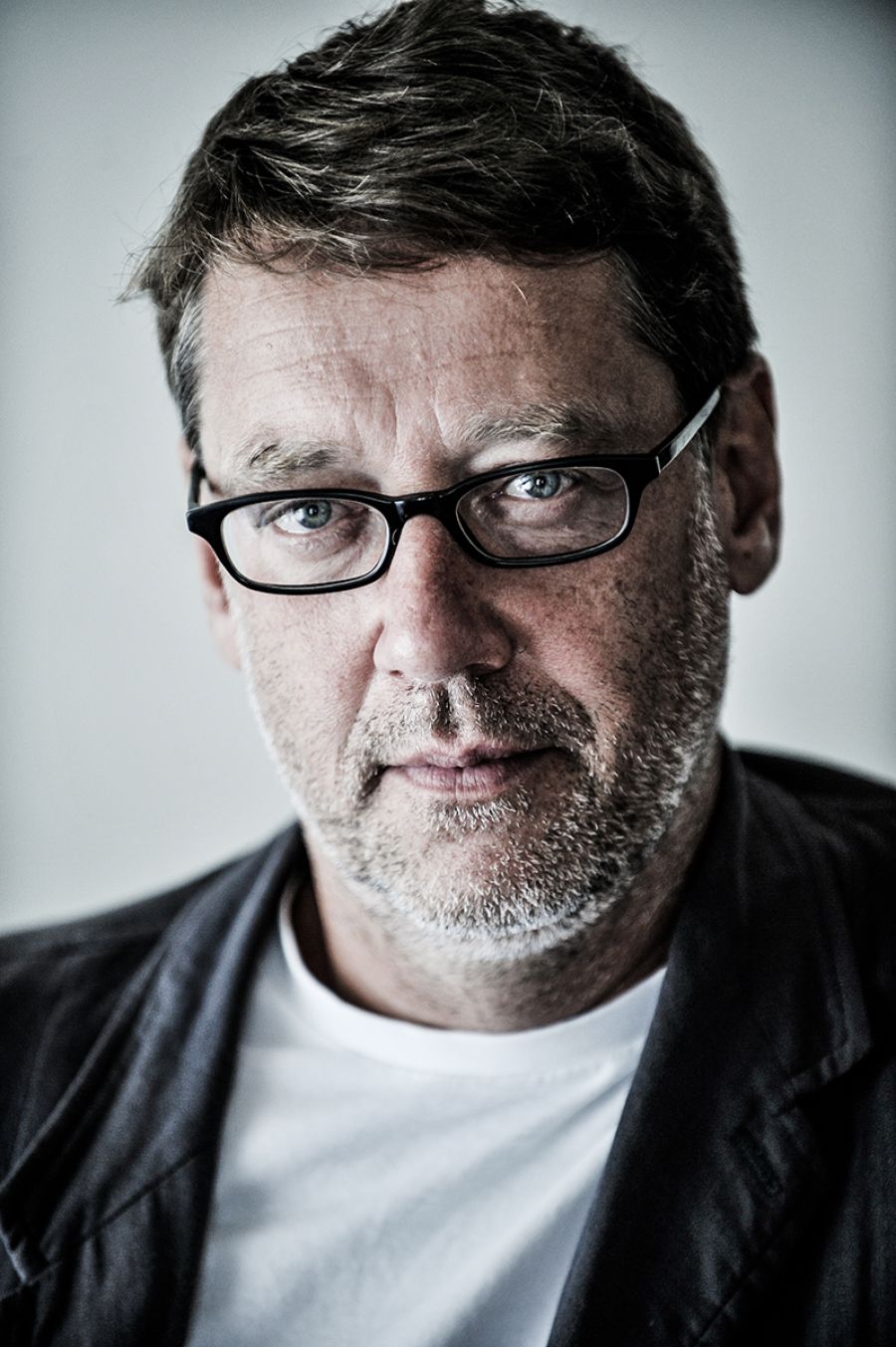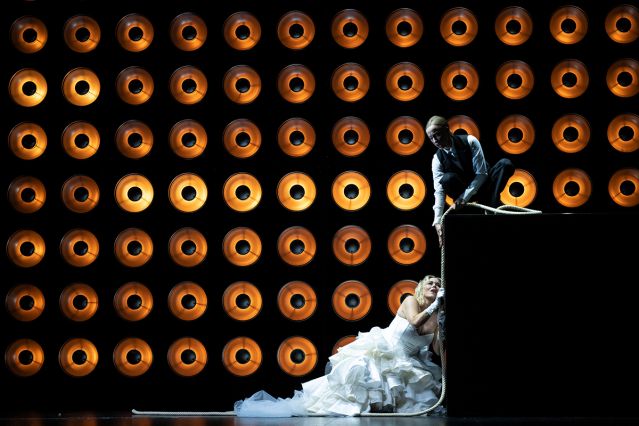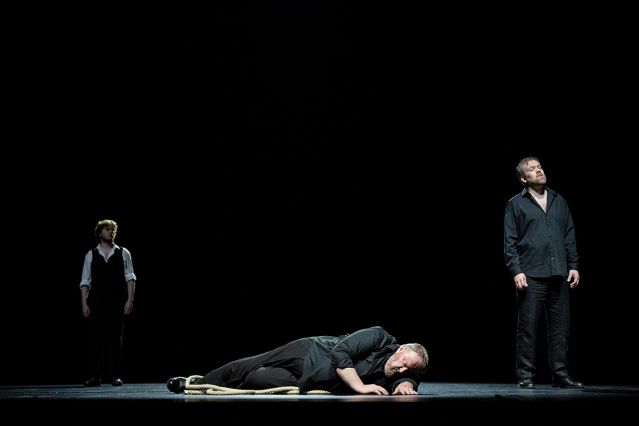Alles Ergreifende ist immer schlicht - Deutsche Oper Berlin
The poignant is always unpretentious
Scarcely any other artist reduces works to their core so radically as Michael Thalheimer. He seeks pain in theatre, not pleasure. The director is now turning Wagner’s TRISTAN UND ISOLDE into a captivating performance about day and night, love and death
Michael Thalheimer doesn't want to settle on a number: maybe seven, maybe just five. What he does know is, "There is only a limited number of stories that we keep retelling and reinventing. We do this to understand who we are, how we are, how and why we act the way we do." In his view, one of these eternal stories is Richard Wagner's TRISTAN AND ISOLDE. Two people meet, fall irretrievably in love with each other at first sight, fall victim to fate and decide to die together. Pure tragedy, and a story essentially made for a director who has the following to say about what drives his work: "In theatre and opera, I'm always interested in the pain." In this case, "The weltschmerz that seeps out of every pore in all of Wagner's works."
TRISTAN AND ISOLDE, a coproduction between the Deutsche Oper Berlin and the Grand Théâtre de Genève, is Thalheimer's third Wagner production following PARSIFAL and DER FLIEGENDE HOLLÄNDER. He would not necessarily describe himself as a Wagnerian ("I don't go visiting every production or spend all my time in Bayreuth"), but, "I have learned to love the composer." He is captivated by the universal and larger-than-life aspects of Wagner's work, and emphasises the singers with whom he worked on TRISTAN AND ISOLDE in Geneva. "They aren't characters we'd meet in a café around the corner. When they meet, it's like two planets colliding without the possibility of separating again."
Originally, Thalheimer—one of the most in-demand theatre play directors in the German-speaking world for 25 years—never wanted to direct opera. He is musical, learned the drums and played in various rock and jazz ensembles in his youth. He was largely unfamiliar with the world of opera and music notes, and he is still unable to read orchestra scores. "On top of that, I didn't have any real grasp on the plots in operas, unlike in plays," says Thalheimer on his initial obstacles. "When I'm asked as a play director to put on a production of Hamlet, nobody knows in advance, myself included, if it will take one hour or five. That's inconceivable in opera."
Still, offers from major theatres poured in. Thalheimer overcame his respectful inhibitions in 2005 and debuted at the Berliner Staatsoper with Leoš Janáček's KATJA KABANOVA. "It was the music that sucked me into the opera sphere," he says. "I even understood Janáček right away. Then it was a whole new eros." Thalheimer proved his talent for radically boiling works down to their core, capturing inner life in impressive imagery, including in musical theatre. This art has little to do with the length of a production and more to do with the ability of summarising the essence of a story. Russian merchant women Katja Kabanova, ensnared in a suffocating web of relationships, spent most of Thalheimer's production sitting in a white chair at the forestage. She had no freedom of movement, forced to maintain her posture. So simple yet so painful.

Thalheimer's artistic creed is, "The poignant is always unpretentious." While others revel in lavish set designs, he makes use of uncompromising minimalism. He used maximal reduction to pull the plug on the overstimulating present, leaving pleasant and easy entertainment to other directors. "You see," the director sighs, "I'm not interested in seeing a choir of green frogs in astronaut costumes singing on Mars. It might be a nice thing to see for a moment, but it's entirely arbitrary to me." He is aware that modesty can be a precarious undertaking, especially in opera, "[...] because the audience often expect something completely different." Wagner is by no means an exception. But Thalheimer does not see himself as one who seeks to meet expectations. "I'm one of those directors who challenge the audience."
Of course, he confesses, there are moments in which he feels the horror vacui. The writer's fear of an empty page, the painter's fear of a blank canvas. Moments in which he is plagued by doubt: Is what I am showing on stage enough? Only to answer his own question the next day: "Yes. We're going to reduce this even further."
He also directs TRISTAN UND ISOLDE on a nearly empty stage. The central element is a moving wall of 260 lights with reflective bulbs. Each of them can be moved, dimmed or brightened to match the respective intensity of the music. Above all else, this reflects the overriding symbolism of day and night in Wagner's opera: "O come down, night of love!" Here is the day, where reason prevails. "There is the night, the mysterious, unknown and dream-like with other laws of reality," says Thalheimer. Symbolism aside, it is the ideal set design for a director who says of himself, "When I've gotten to the core of a work, I don't really need anything other than the text, the characters and a spotlight. Every story can be told under a streetlight. Every story."
The idea for this light wall came from a conversation with set designer Henrik Ahr. "I need space, I need room for the singers, I don't want realism," explains Thalheimer. "What interests me most is the light." He did not stipulate anything else. "Set designers are artists in their own right and I still want them to surprise me." Sometime later, Ahr and the light designer Stefan Bolliger came to Thalheimer with the idea for the lightbulb installation. "Oh," said Thalheimer, "you took it literally."

He is often considered a concept director who dictates each step and gesture from the very start. But this is not true. His portrait book contains the anecdote of when, during rehearsals for Emilia Galotti at the Deutsches Theater, he spent ten days in the sun out in the courtyard talking with the ensemble—much to the chagrin of then-intendant Bernd Wilms. Of course, the director has an idea of where things will go from the beginning. "I'm just always looking for how to get there together with the ensemble and the singers during rehearsals." Sometimes they end up going down the wrong path. For example, the idea of having an entire scene of TRISTAN performed in the dark only to then realise, "This is absolute nonsense," laughs Thalheimer. Missteps like these are part of any journey.
When TRISTAN AND ISOLDE leaves Geneva to premiere at the Deutsche Oper Berlin, much will be left unchanged, including the set design. But there may and should be new ways to interpret Wagner during the six weeks with the new ensemble. "I'm open to where things lead," says Thalheimer.
He often uses the word "openness", even when describing the difference between a play and an opera production. At first, he had to realise that he could not demand the same level of acting prowess from the singers as he would be with a theatre ensemble. "Let's take the second act from TRISTAN UND ISOLDE, the long love duet. It's demands so much of the people and their bodies from a vocal perspective alone that they have to concentrate on it with all their might. Otherwise, they'll get lost." In this regard, plays and opera are two fundamentally different worlds for him. "Nobody would think to equate them," he says.
Yet Thalheimer does not distinguish between the two art forms when it comes to the search for knowledge and catharsis that drives him, and that he believes has to be painful. "Only through pain can we learn."
He is aware that this approach will be met with resistance. Such was the case with the production that quickly made him famous in 2000, Franz Molnár's Liliom at the Thalia Theater in Hamburg. Thalheimer used a gigantic wooden cube made by set designer Olaf Altmann to project the major plot points in the story of the poor fair barker Liliom and his beloved Julie as oversized, cold pictographs: man and woman. Father, mother. Child. Money. Above all, Thalheimer divorced the piece from all social kitsch and depicted Liliom as a rough, impotent, violent criminal, even against himself. A suicide case in a rain of blood. The production turned into both a scandal and a major success, and the tone was set for Thalheimer's future career.
Like all people, Michael Thalheimer wants to be loved. "We only get out of bed in the morning because we want to be loved," he says, pausing briefly before continuing, "But not by just anyone." He prefers to polarise instead of create easily digestible theatre that puts people in a good mood. How could that be compatible with the themes and subject matter that he works with? Or, in Thalheimer's words, "Do you think that Wagner ever sat at the table and thought, I'm feeling swell today, I'm going to compose PARSIFAL?"
The director also put on a production of Wagner's solemn Holy Grail drama in Geneva. While doing so, he often thought of Christoph Schlingensief, who brought PARSIFAL to the stage in Bayreuth and referred to Wagner as "death music" that lures you into the beyond with siren song: "For the last time! For the last time!" Schlingensief even placed the origins of his cancer diagnosis in Bayreuth. Thalheimer also feels that Wagner's music holds a dangerous beauty in its interplay between Eros and Thanatos: "Giving in to the weltschmerz, which cannot be illustrated any more clearly than it is in PARSIFAL, can lead you to depression. You need armour for it." He usually spends rehearsal-free weekends out in nature, on mountains, in the sun, clearing his head. Even a passionate shadow-caster like him needs breaks from the pain.

Much of the conversation with Michael Thalheimer at a café in Prenzlauer Berg is about courage. The courage to be outwardly uneventful in an opera like TRISTAN UND ISOLDE, which refers to itself as "a plot in three acts" but in fact contains one of Wagner's least action-packed plots. The courage to abstain from explanations of the world, "[...] because I myself have more questions than answers," says Thalheimer. And the courage to engage with pathos. After all, this is opera, where the most fervent arias are sung in death, where feelings do not have to pass through the filter of reflection.
"I'm not afraid of pathos," the director emphasises. "As a viewer, I usually don't like entirely unemotional productions." For him, it comes down to not leaving this pathos unquestioned in his work, and rather to dig into it like everything else. Otherwise, it remains awkward and hollow. "But of course, Isolde's love-death in the third act is emotional," says Thalheimer. "It's always emotional when someone decides to end their life, no matter how banal the manner in which it happens."
The question remains: What is the core of this work, of this eternal story? According to Thalheimer, there is no simple way to answer this, let alone in a single sentence, because of the complexity of Wagner's opera tragedy. "Maybe," he thinks, "the core is the impossibility of love. Maybe everything comes back to the question, what is it anyway—love?"
Patrick Wildermann is a freelance cultural journalist focusing on theatre and film. He lives in Berlin and writes for Tagesspiegel, the interview magazine GALORE and the city magazine tip.




